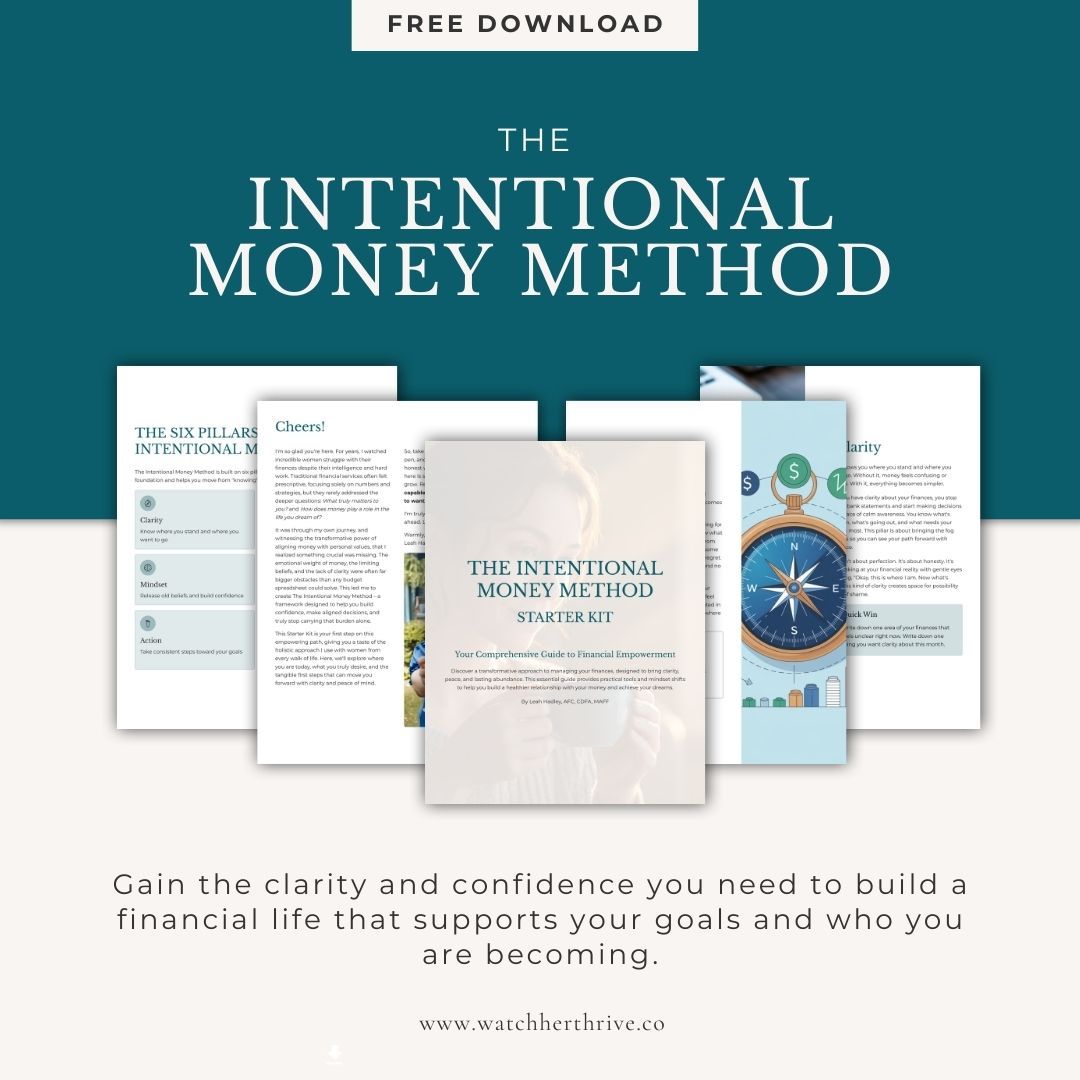Start with Your Mindset: How to Get Your Finances in Order

Starting or maintaining a budgeting system can be a daunting task. Trying different methods until you find one that works is not uncommon. But, having the right attitude toward money, savings, and budgeting plays a crucial role. In this post, we explore five essential mindset shifts - strategies to get your finances in order.
Strategy #1: Embrace Money Transparency
Neglecting your financial situation can be incredibly stressful, particularly when unexpected expenses arise. That's why it's crucial to establish a budget that encourages you to address your finances proactively before a crisis strikes, enabling you to have a clearer and more comprehensive understanding of your financial standing.
By embracing the habit of checking your bank account on a daily basis, you can easily track your progress, make adjustments when necessary, and ultimately feel more empowered and in control of your financial well-being.

Strategy #2: Understand that Budgeting is a Process
When it comes to finding the perfect budgeting system, it's akin to embarking on a search for a life partner. Just as relationships require time and effort, so too does finding the ideal budgeting system. It may take a few attempts, and there might be some trial and error along the way. But fear not! Remember that this journey is about fine-tuning and aligning the system with your specific needs and financial goals. It's a process that demands patience and perseverance.
During this exploration, you may find yourself experimenting with different strategies and approaches to effectively stick to your budget. Don't be disheartened if one method doesn't yield the desired results. Instead, embrace the opportunity to keep exploring and trying different approaches.
It's through this process of discovery that you'll eventually stumble upon the perfect match—a budgeting system that empowers you to achieve your financial objectives and brings you closer to financial freedom. So, stay committed, stay curious, and keep striving for that perfect match!

Strategy #3: Consider Your Future Self
When creating a budget, take a moment to envision your future self and the goals you want to achieve. Before deviating from your spending plan, ask yourself if the purchase aligns with your long-term interests and aspirations. By adopting a budgeting strategy that prioritizes your future self, you'll cultivate discipline and remain focused on reaching your goals. This approach will empower you to make informed financial decisions that contribute to your overall success and fulfillment.
Strategy #4: Focus on Goals, Not Scarcity
Budgeting doesn't mean you can't enjoy your money; it's about making intentional choices on how to spend it wisely. By focusing on what you're aiming to achieve, whether it's saving for a dream vacation, buying a new car, or investing in your future, you'll perceive budgeting as a powerful tool that not only helps you prioritize your goals but also empowers you to make your dreams a reality.
Imagine waking up on a sandy beach, feeling the warm sun on your skin, and sipping a refreshing cocktail. Visualize cruising down the open road in a sleek and shiny car that turns heads wherever you go. Envision yourself sitting in a cozy office, confident in your financial security, knowing that you've made smart investments for your future.
Budgeting is not just about restricting yourself; it's about creating a roadmap to success. It's about getting your finances in order and making calculated decisions that align with your aspirations. By embracing budgeting as a positive and empowering strategy, you can transform your dreams into tangible achievements.

Strategy #5: View Each Budget Line Item as a Joyful Exchange
You have the freedom to afford a wide range of things, but it's important to remember that you can only spend within your means. Therefore, it is wise to allocate your resources towards experiences and possessions that genuinely bring you joy and satisfaction. By cultivating the mindset of viewing every transaction, even mundane ones like paying bills, as a joyful exchange, you can infuse a sense of reward and fulfillment into the process. This approach adds richness to your financial journey and enhances your overall well-being.
The book Dollars and Sense: How We Misthink Money and How to Spend Smarter by Dr. Dan Ariely and Jeff Kreisler offers more insights into budgeting mindset shifts. This guide will help you recognize spending patterns and establish systems that enable effective budgeting.
Adopting these strategies for improving your mindset to get your finances in order will not only help you stay on track but also make significant strides toward your financial goals!

Take Action and Get Your Finances in Order
Now that you've cultivated the right mindset to get your finances in order, it's time to take action. An integral part of effective financial management is setting both short-term and long-term goals. This provides you with a clear direction and serves as motivation to stay on track with your budget.
SMART Goals
When setting financial goals, it is crucial to make them SMART: specific, measurable, achievable, relevant, and time-bound. This means going beyond a general statement like "I want to save money" and instead creating a goal that is more detailed and specific. For example, you can set a goal like "I will save $1500 in the next three months by reducing unnecessary expenses, such as eating out less and cutting back on subscription services." By adding this additional level of detail, you will have a clearer and more actionable plan to achieve your financial goals.
Break Goals into Actionable Steps
Once you have your goals in place, it is crucial to break them down into smaller, actionable steps. By doing so, you make your goals more manageable and attainable. This approach allows you to have a clear roadmap, guiding you toward your larger objective. Moreover, as you start ticking off each milestone along the way, you will experience a sense of accomplishment and motivation, propelling you even further toward success. So, take the time to break down your goals and enjoy the journey of progress and achievement!
Sample SMART Financial Goals and Actionable Steps
Eliminating Credit Card Debt
Sample SMART Goal: Within the next 12 months, I will completely eliminate all of my credit card debt.
Action Steps:
1. Begin by documenting the balance, interest rate, and minimum payment for each credit card.
2. Explore available options to potentially reduce your interest rates. This could involve consolidating your cards into a loan, negotiating a lower rate with the lender, or taking advantage of promotional balance transfers.
3. Calculate the monthly payment required to achieve your goal of becoming debt-free within 12 months.
4. Cease using your credit cards. Be mindful not to allocate so much towards payment that you're left with insufficient funds for living expenses. Instead, consider reevaluating your timeline and opt for lower payments, ensuring you avoid accruing additional debt.

Purchasing a New Home
Sample SMART Goal: I aim to acquire a new home worth $500,000 within a span of 4 years.
Action Steps:
1. Determine the desired amount to save for a down payment and moving expenses.
2. Establish a dedicated account to kickstart the savings for your new home.
3. Calculate the monthly savings required to achieve the goal of purchasing a new home within 4 years.
4. Arrange for an automated deposit into your house savings account and witness your funds grow steadily.
Once you've gotten clear on your SMART goals, you know what you want to prioritize. Does your monthly allocation of cash reflect what's most important to you? If not, it may be time to either increase your income so you have more money to allocate each month or reduce your spending so you can put more money toward your goals.
Review & Adjust Your Budget Regularly
It's also crucial to regularly review and adjust your budget as necessary. Life circumstances and unexpected expenses can arise, so it's important to be flexible and make the required changes to your budget. By consistently monitoring your financial situation, you can proactively make adjustments to ensure you stay on the right track.
If you've struggled with credit card debt, prioritizing the buildup of your savings account is vital. Unforeseen expenses are bound to occur, and relying solely on credit cards perpetuates a cycle of debt. Ideally, aim to save at least 3-6 months of non-discretionary expenses in an emergency fund. Having this financial safety net will provide you with peace of mind and prevent the need to rely on credit cards in times of unexpected financial strain.

Review Your Credit Report
Another important aspect of managing your finances is regularly reviewing your credit report. This document contains information about your credit history, including payment history, outstanding balances, and any accounts in collections. It's essential to review this report at least once a year to ensure accuracy and identify potential areas for improvement.
If you notice any errors or derogatory marks on your credit report, take the necessary steps to dispute them and improve your score. A better credit score can lead to lower interest rates on loans and credit cards, ultimately saving you money in the long run.

Review Your Insurance Coverage
Another crucial aspect of getting your finances in order is having adequate insurance coverage. Whether it's for your health, home, car, or life, insurance provides protection and peace of mind in the face of unexpected events.
Take some time to review your current insurance policies and make sure they align with your needs. For example, if you've recently purchased a new car or had a significant life event like marriage or having children, you may need to update your coverage accordingly. An independent insurance agent can be a great resource for comparing insurance companies.
When it comes to insurance, it's important to prioritize quality over cost. Opting for the cheapest option may leave you with inadequate coverage. For instance, when choosing a health insurance policy, ensure it encompasses all the essential services and medications you require while also having a reasonable deductible and out-of-pocket expenses. Remember, it's crucial to strike a balance between affordability and comprehensive coverage.
When reviewing your insurance coverage, also consider if you have any gaps in coverage. Perhaps you don't have disability insurance or long-term care insurance, which can be crucial for protecting your finances in case of illness or injury.
It's also essential to regularly review and update your beneficiaries on life insurance policies. If you've recently gotten married or divorced, had children, or experienced other significant life changes, make sure your beneficiaries are updated accordingly.
Having adequate insurance coverage not only protects you financially but also offers peace of mind knowing that you're prepared for unexpected events. Take the time to review your policies, make any necessary updates, and rest assured that you have a safety net in place.
Remember, achieving financial stability is a journey that requires consistency and commitment. By setting clear goals, breaking them down into actionable steps, and regularly reviewing your budget, you are taking important steps toward a healthier financial future.
You Don’t Have to Do This Alone
You’ve done the hard part—shifting your mindset and getting intentional with your money. The next step is staying consistent, supported, and inspired as you put it all into action.
Inside The Empowered Sisterhood, you’ll find a community of women who are walking the same path toward financial peace. You’ll get tools to help you stay accountable, workshops that deepen your financial confidence, and weekly conversations that remind you that progress, not perfection, is what truly matters.
Your financial transformation doesn’t happen in one big leap. It happens one intentional step at a time—and you don’t have to take those steps alone.
👉 Join The Empowered Sisterhood today and start creating the financial life you’ve been envisioning—with guidance, community, and purpose.
Additional reading to help you get your finances in order:
Two Simple Steps to Improve Your Money Mindset
Budgeting for Women Over 50: Path to Financial Freedom
15 Best Budgeting & Money Management Tools
Use these 5 Steps to Give Your Budget a Check-Up
6 Budgeting Myths to Stop Believing (and the Truths Instead!)




